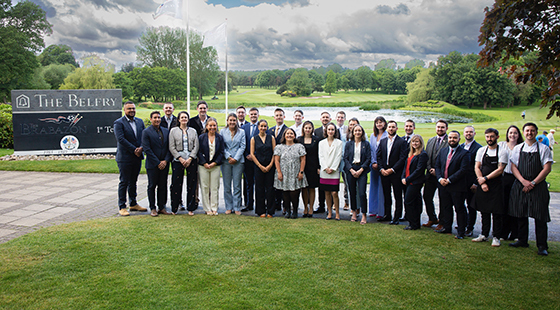Foodservice: A decade of change
Ten years is a long time in hospitality. Noel Mahony and Jonathan Doughty reflect on the factors that have seen seismic changes occur in the industry over the years since 2005. Brendan Coyne reports
Ten years ago, Noel Mahony, then incoming MD of newly merged BaxterStorey, and Jonathan Doughty, then MD of consultancy Coverpoint, spoke to The Caterer and gave their take on where the industry was headed.
They talked about the rise of the independents, investing in staff, services and skills, and how they hoped consultants would swap long lists and tick boxes for cultural matchmaking.
But 10 years is a long time. Back then, Apple didn't make phones and Lehman Brothers existed. "It was pre-recession, pre-London bombings, pre-Olympics," says Mahony.
"Pre-pretty much everything that profoundly changed the world," ventures Doughty, head of EMEA Foodservice Consulting at the now JLL-owned Coverpoint.
Hungry high street
There were also fewer than 3,000 coffee shops on UK high streets, says Mahony, now BaxterStorey co-CEO. There are 19,000 today.
"I don't think it's because people are drinking that much more coffee," he says. It's because their high-street owners spied an opportunity. They also eyed the launch of the contract caterers. Both Mahony and Doughty hate the term ‘contract catering', but both agree the highstreet's impact has been profound.
The sector was "blindsided", admits Mahony. "Ten years ago the competition was the other ‘contract caterers'. Now it is every opportunity that the customer has to eat somewhere else. We only come up against our ‘contract competitors' every three, five or seven years when a piece of business may come up for tender."
Mahony says that the industry has become "more customer-orientated than clientorientated", as a result. Meanwhile, although annoyed that catering is still seen as "the cost sector", Mahony believes clients see service providers as partners.
Doughty says contractors are "bolder and more financially sensitive" and know when to say no to terms that aren't viable. "They no longer focus on the first and last six months of a contract," he says. "That was the bane of our industry. Now there is a continuous relationship. As a result, satisfaction levels are steadily going up."
Has that resulted in greater levels of contract retention? Doughty says industry data is patchy. "But from our data set, the indications are that contract retention is getting longer, which must indicate that client teams are closer to happiness than they were."
Greedy consultants
âConsultants have been culpable,â he says â" a bit of an indictment given Doughty is worldwide president of the Foodservice Consultants Society International. âThere are a certain number who only do contract tendering. It is in their interest to create churn and dissatisfaction. If they put one-tenth of that effort into helping their clients solve problems with partners, I think contract lengths would increase again. It is a fundamental issue.â
Mahony agrees that the issue remains unsolved. But he has reasons for optimism.
âI donât think it has changed. But we are starting to see some sense â" interestingly, not from consultancies but predominantly from clients themselves. They will get into a competitive dialogue situation and speak about the important things before tendering. So they already have a shortlist, a match of good cultural fits, and then they will go to two or three companies through a tender. But that is coming directly from clients rather than necessarily through procurement teams or consultancies.â
As some contract operators misread the threat of the high street, Doughty believes consultants are also guilty of âlooking the wrong wayâ in terms of recognising that shift. He says: âWith or without them, business will transact. It is not acceptable that contract partners are asked to pay £40,000 to £50,000 just to go through a process when there are eight other people around the table [many of whom have no cultural fit]. One of the key
things the industry has to tackle over the next 10 years is the level of waste we create.â
Just desserts?
Doughty said the same thing 10 years ago, and he thinks budgets âare still sitting in the wrong placeâ â" namely, with procurement â" because of a post-recessionary lag.
Mahony also points out that, despite the sector having come on in âleaps and boundsâ in terms of its people and services, it has yet to gain recognition. He believes the nomenclature doesnât help.
âThe term âcontract cateringâ does the whole sector a disservice, especially if you look at how our sector has performed in the last 10 years and the quality of the individuals involved. We have had a barista recently come in the top three of all UK baristas â" not just in our sector, but the high street, everything. And somebody from one of our competitors [Lussoâs Daniele Quattromini] has justwon the Gold Service scholarship after going up against people from the best restaurants in the UK. This is brilliant for our sector.
âAnd yet,â Mahony adds, âwe are seen as âcontract cateringâ or, and this really winds me up, âcost sectorâ. If we continue to call ourselves âcost sectorâ, is it any wonder procurement companies just focus [on cost]?â
Longer shelf life
Whether progress is fully recognised, Doughty says a people-centric focus has changed the whole ethos of the sector. âIn the old days, in what used to be the cost sector, it was about borrowing someone elseâs money, growing it, selling it on and doing the same thing again.
There was no vision past making money out of that. Thatâs what has changed in the last 10 years. Instead of being happy with a high level of failure and replacement, this industry has got its head around the value of retention, development, skills and ownership of people.â
Ultimately, says Doughty, it is cheaper âbecause if you are not recruiting lots of new people all the time, you can spend that money on service delivery and client development, not just client retentionâ.
Given that shift, does Mahony think his business & industry sector can now match the high street in terms of customer experience? âNo. I think there is work to do both within Baxter-Storey and the sector. But I think there is a fundamental recognition that price, value, choice, experience are now the minimum benchmark.âÂ
How BaxterStorey has changed in 10 years
| Â | 2005 | 2014Â Â |
|---|---|---|
|  Turnover |  £101.5m |  £357m |
| Â Number of employees | Â 2,775 | Â 8,500 |
| Â Number of locations | Â 280 | Â 812 |
BaxterStorey highlights
2004 ⢠Merged with Baxter Smith
⢠Noel Mahony joins as managing director of BaxterStorey
2005
⢠BaxterStorey achieves £100m turnover
2006 ⢠Chef Academy launched
2007 ⢠John Bennett joins as co-managing director of BaxterStorey
⢠BaxterStorey Ireland launched
⢠WSH acquires Holroyd Howe and Benugo
2009 ⢠Barista Academy launched
2011
⢠Noel Mahony appointed CEO of BaxterStorey UK & Ireland
2012 ⢠BaxterStorey feeds the worldâs media at London 2012 Olympics
⢠Leadership Academy launched
⢠The Caterer names WSH chairman Alastair Storey as the most powerful and influential person in hospitality
⢠John Bennett appointed co-CEO of BaxterStorey UK & Ireland
2013
⢠BaxterStorey executive chef Hayden Groves wins National Chef of the Year award
⢠BaxterStorey wins Procurement Team of the Year at the Foodservice Cateys
2014
⢠WSH businesses win three Foodservice Catey awards: training award, catering manager of the year award and regional manager of the year award
⢠WSH acquires Searcys
The next 10 years
Doughty and Mahony think broader consolidation and the merging of retail with business & industry sectors will continue.
âSignificantly, outside the core areas of where it is now,â according to Mahony. Doughty straddles both sectors. âThere are so many high-street operators looking to the contract sector for financial support,â he says. âThere is such a crossover. I would be very surprised if we donât see lots being acquired.â
Buying is better than building, adds Doughty. Mahony agrees, and points to the 2007 acquisition of Benugo (which has since quadrupled its turnover) and the recent move to buy Searcys as examples. âWe could have said to Benugo âletâs go and create a Champagne bar and take Searcys onâ. But they are good at it. So letâs create a structure around it and let them flourish.â
Mahony says itâs the opposite of turning up with the âtanks on their front lawnâ once the deal is signed. âYou are investing in the management team, their ability to grow.â
Remaining a collection of specialist niche businesses is what will set the successful independent groups apart, says Doughty.




















